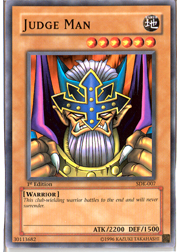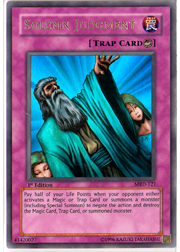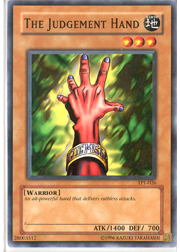 This week I’d thought I’d share my thoughts and experiences on the other side of the game: judging. Yes, judging. It is, in my opinion, as difficult as becoming a championship-level player (probably more difficult). Judging requires a special type of person who’s willing to put him- or herself in situations where he or she may be sorely disliked.
This week I’d thought I’d share my thoughts and experiences on the other side of the game: judging. Yes, judging. It is, in my opinion, as difficult as becoming a championship-level player (probably more difficult). Judging requires a special type of person who’s willing to put him- or herself in situations where he or she may be sorely disliked.
But don’t let that scare you off. Judging is a lot of fun when you get the hang of it. However, you don’t get to be a good judge in just a few short weeks. It takes months and sometimes years to really "get it." To shorten that process I’m here to offer a brief guide to things that I’ve learned judging since 2004 that I feel every judge should know. Let’s get started.
Judge Tip #1: Judging Is Not Easy
I think it’s fair to state this fact right from the get-go: judging is not designed to be easy. It requires a degree of professionalism, a strong work ethic, patience, memory, and temperament to do well. Not everyone can do this. You can’t be wishy-washy, and you have to learn to be tough sometimes, even with your friends. In some cases the job even requires physical labor. You’ll be carrying chairs, tables, and table cloths back and forth throughout the event. You’ll be asked to pick up trash that players leave behind. You’ll be rearranging chairs, setting table markers, disassembling tables, and more. Sometimes you’ll have to babysit the younger players or teach a few people how to play the game that they never have before. You’ll have to watch carefully for theft and illicit cash trades. As if that wasn’t enough, you’ll have to know all the latest ruling changes, terminology, and penalty guidelines.
Judge Tip #2: The Judge/Player Relationship Is Sometimes Adversarial
I’ve been on both sides of the spectrum. Any player who’s a judge can agree with me on this. Part of your job is to correct people when they are wrong, and nobody likes to be corrected publicly. Another part of your job is to keep shady players who try to rule-shark in line. You are the authority figure during the eight to twelve hours that the event lasts. The players will respect you, but that doesn’t involve them liking you or treating you in a friendly way. The same happens when you’re in the players’ shoes. The last thing you need is a judge telling you that you’re getting a game loss because you wrote your decklist wrong.
I had to do just this to a new friend of mine recently at the Sebring, Florida Regional Qualifier because he wrote his three copies of Great Shogun Shien twice. Clearly, I know that you can’t have six copies of the Shogun in your deck, but rules are rules when it comes to decklists. Big Brother is watching folks (though my friend won the match anyway).
Judge Tip #3: The Players Can and Will Be Ruthless
Don’t expect mercy from the participants. They’ll be nice to you as long as you’re not issuing penalties. They’ll be nice to you as long as they think you know what you’re doing. If they don’t respect you, they will go right over your head and appeal to the Head Judge without giving you a chance. Part of the job is to shrug that off. Keep in mind that these folks are trying to win. They don’t want penalties. They don’t want to be corrected. They want things to go smoothly just like you do. If you don’t get in their way, they won’t get in yours. I’ve even been in rulings situations where players would yell at me because of a ruling I gave them that I knew was clearly right. Funny thing is . . . the player knew that too. He just wanted to make a ruckus to get me to buckle under the pressure.
 Judge Tip #4: Use Leniency with Caution
Judge Tip #4: Use Leniency with Caution
When you grow accustomed to the judging experience, leniency here and there is acceptable. However, you should use this leniency sparingly. It’s a double-edged sword that can get you into trouble. If you start being too lenient with your players, they can develop non-constructive attitudes. Some players come to believe that they have you in their back pockets because you gave them a break. They start to believe that the next time there’s a "he said/she said" type of dispute you’ll show them favor, when really nothing could be further from the truth.
Speaking of favoritism, that’s another thing to be very careful of. You should never show favoritism to any players, especially if they’re on your team. Special treatment for a limited number of individuals can be destructive not just to your reputation as a judge, but also to the integrity of the match and the tournament itself.
Judge Tip #5: Decklist-Checking Is an Art Form
There are some judges who are very good at checking decklists, and there are some who are very slow at it. I happen to fall into that latter category. I can do it fairly well, but I’m not a wiz at it like some people I know. If you’re assigned to decklist duty, I have a few suggestions: (1) count the deck and side deck twice, (2) learn to decipher elementary school handwriting, (3) card abbreviations should be understandable, and (4) learn to quickly spot extra copies of cards that shouldn’t be there. The reason I mentioned number two is because there are younger children who play this game at the premier level. Also, there are some players near my age who still don’t write very well. If you can read a wider range of handwriting styles than most, then your average run of decklist verifications will be far easier.
Judge Tip #6: Punctuality Speaks Volumes About You
Often, if not always, you are working directly for a tournament organizer’s company which can choose whether or not it wants to recruit you for an event. My local event manager here in Orlando is absolutely ruthless about punctuality. If you’re five minutes late, she’ll give you an earful. I made this mistake once and I’ve regretted it ever since. You’ll probably be luckier than I was though: most of the time you won’t get yelled at. In fact, you won’t hear anything about it. When they don’t ask you to work at the next event, then you’ll get the point.
All other things aside, not being punctual says a lot about your commitment as a worker, your honesty, and the level of trust you can be given. I know I want those packs at the end of the day, just as I want to continue judging and contributing. I do my best to be at the event on time, every time so that I don’t compromise any of my goals.
Judge Tip #7: Gossip Circles Are Not Allowed
I’ve been guilty of this a few times. There’s a tendency for judges to congregate together in one spot to chat and completely ignore the event. I understand this completely. There are all kinds of rationalizations for it, but unfortunately they’re all pretty much irrelevant. The only reason for this to occur is to discuss a complicated ruling with your judge team. Any time active floor judges are grouped together instead of dispersing themselves across the tournament floor, an inadequate job is being done.
 Judge Tip #8: Keep Pace with the Game and Assert Your Authority
Judge Tip #8: Keep Pace with the Game and Assert Your Authority
The final and most important tip of all is to maintain your authority. For the course of the event, you are one of many authority figures. You are there to ensure the smooth transition of events for the day and correct any abnormalities. Believe it or not, the players actually enjoy it when the event is run smoothly without snags. When the rulings are fair and understood, and the authority is clear, players will respond with respect and courtesy most of the time. I know I personally enjoy a well-run event with a staff of competent, confident, and authoritative judges.
The best way to keep your air of authority is to stay up-to-date with the new rulings, cards, and nuances of the game. Constantly try to upgrade your Judge Certifications. Keep tabs on the UDE Judge Forums
. Despite how "mean" players can be, they rely on you to provide accurate information on how the cards are supposed to interact. A mistaken ruling could result in dissolving any chance of making the Top 8 or Top 16.
Final Thoughts
I’ve given you some good advice on how to mold yourself into a more effective floor judge at premier events. The event can be a Regional Qualifier, Shonen Jump Championship, National Championship, or World Championship. It doesn’t matter. Premier events demand professionalism, procedural correctness, and common sense. It’s really a fun job when you’ve gotten a few events under your belt: you can meet a lot of different players who you wouldn’t meet otherwise. You’ll meet a lot of prominent Upper Deck representatives too, and get a chance show them what you’ve got. Plus, you’ll get paid for something you love to do. Does it get any better than that? I take great pride in my role as a judge at tournaments and I do the best that I can. I hope you will too.
In the future: get ready for the companion article to this one—"The Head Judge’s Guide to a Well-Run Premier Event."